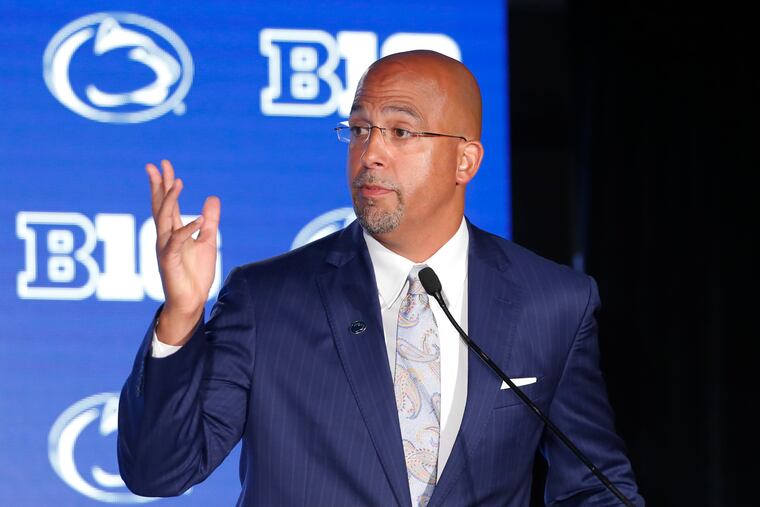Former team doctor sues James Franklin, Penn State, after losing job, claiming violation of Pa. whistleblower laws
The suit alleges that Franklin pressured Dr. Scott Lynch to return injured players to the field, and that he was removed from his role so the university could "avoid scandal."

A former Penn State University team doctor has filed a lawsuit alleging that head football coach James Franklin improperly tried to influence his decision-making on injured athletes and pressured him to return them to the field.
Scott A. Lynch, who was removed in March as the football team’s orthopedic physician and the university’s director of athletic medicine, filed the suit Friday in Dauphin County Court in Harrisburg listing several defendants, including the university, Franklin, vice president of athletics Sandy Barbour, Penn State Health, and the Milton S. Hershey Medical Center, his employer.
The suit seeks damages for his removal, which Lynch, who is represented in the suit by Steven F. Marino of Philadelphia-based Marino Associates, said was because of his complaints over Franklin’s alleged actions.
Marino did not return a call seeking comment.
The suit contended that Lynch’s removal from his position was punishment for reporting to the appropriate authorities about Franklin’s actions and a violation of the Pennsylvania Whistleblower Law. The suit also claims Lynch was released in an effort by the university to avoid scandal.
In a statement, Penn State Health said it rejected Lynch’s claims “and will vigorously defend our program and its representatives.” It said the change in leadership was “completed with the best interests of student-athletes in mind, given the increasing complexity and growing demands of sports medicine, as well as health care in general.”
Lynch officially was released March 1 and replaced by Wayne Sebastianelli, who held that role at Penn State previously for two decades before being reassigned in 2014.
The suit accused Franklin of “creating a culture and climate which obstructed” his ability to make “diagnostic, therapeutic and return-to-play decisions in connection with the best practices of medical management” for Penn State’s student-athletes.
It also said Franklin, “on multiple and repeated occasions … attempted to interfere with [Lynch’s] autonomous authority to determine medical management and return-to-play decisions related to student-athletes.”
Lynch said in the suit that he reported Franklin’s attempts “to influence and interfere” with him to Barbour, the Milton S. Hershey Medical Center, and Robert Boland, the university’s athletic integrity officer.
However, he said that in January 2019, Barbour and senior associate athletic director Charmelle Green requested that Lynch be relieved from his duties as orthopedic physician and director of athletic medicine to Kevin P. Black, his director supervisor. Green and Black also were named as defendants in the suit.
“The demand … arose as a result of the plaintiff’s good faith reporting of [Franklin’s] attempts to influence and interfere with the plaintiff’s medical management and return-to-play decisions related to student-athletes,” the suit said.
The suit said “the undue and improper influence exercised” by Franklin over “the supervision of the plaintiff’s professional assignment” was another factor in the demand for Lynch’s removal.
Lynch also said in the suit that the defendants “crafted a false narrative” in explaining the decision to remove him, claiming it wanted an orthopedic surgeon who resided in State College rather than one in Hershey, which is about 100 miles from State College, and where the Milton S. Hershey Medical Center is located and where Lynch is based.
The Penn Health statement also said Penn State Health was “grateful” to Lynch for his years as director of athletic medicine “and for his continued association with the health care provider."
Lynch wrestled for Penn State in the 1980s, winning a national championship in 1984 and earning All-American honors three times.
He was named orthopedic physician for the football team in February 2013, nearly a year before the hiring of Franklin. The job of director of athletic medicine was added in August 2014.
Read the full lawsuit: